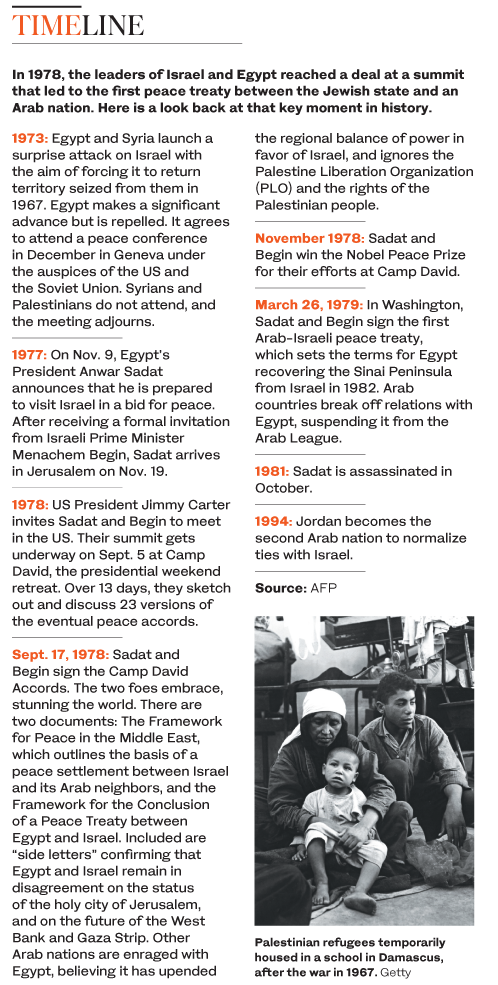BEIRUT: Forty years after Egypt and Israel signed the Camp David Accords, regional experts expressed their disappointment in an agreement that failed to fulfil its promise of a peaceful settlement in the Middle East.
The accords led to the first peace treaty between Israel and any of its Arab neighbors: The Egypt-Israel Peace Treaty, also known as the Framework for Peace in the Middle East, in 1979.
Brokered by US President Jimmy Carter between Israeli Prime Minister Menachem Begin and Egyptian President Anwar Sadat, the agreement was negotiated over 13 days for Arab recognition of Israel and the withdrawal of Israeli forces and citizens from the West Bank.
Dr. Majid Rafizadeh, president of the International American Council and a board member of the Harvard International Review, said the accords should have included other relevant critical issues in the region.
“They didn’t address the underlying reason behind tensions in the region, but they partially normalized political and economic ties between two nations (Egypt and Israel),” he said.
“Whether scholars and politicians agree or disagree with the objectives and consequences, it has been a historic agreement in the sense that it has survived for four decades and exceeded the expectations of some people.”
Political will and strong leadership can lead to diplomatic breakthroughs, said Rafizadeh. “Although such a diplomatic breakthrough may not resolve all the underlying issues and tensions between nations, it can be the first step to normalizing relationships and preventing devastating wars.”
He added: “The significant lesson that we should learn is that in order to strike historic accords, parties should be willing to carry out some fundamental changes in their policies.”
Rafizadeh, an Iranian-American political scientist, used the Iran nuclear deal as an analogy where such a lesson could be applied.
“One of the underlying reasons why the nuclear deal has fallen apart is that Iranian leaders were not willing to alter any core pillars of the regime’s revolutionary ideology,” he said.
With Egypt being the largest Arab state, the Camp David Accords ended the possibility of an Arab military defeat of Israel.
“The only states that might have been interested in this, such as Syria and Iraq, were unable to defeat Israel without Egypt,” said Mark Katz, professor of government and politics at the Schar School of Policy and Government at George Mason University.
“What is also important is that the Egyptian-Israeli peace agreement, signed 40 years ago, has lasted all this time and seems likely to continue doing so.”
The main benefit, he added, was that there had not been a major inter-state Arab-Israeli war since then, although there has been conflict between Israel and Lebanese actors such as Hezbollah.
-----
READ MORE
Egypt appreciates revolution and war more than peace
Today’s leaders should learn lessons of Camp David Accords
-----
However, the accords’ main failing is the lack of settlement of the Israeli-Palestinian issue, as they called for.
“It is highly doubtful that there can be another Camp David-like agreement,” Katz said. Israel’s current government “is clearly unwilling to make peace with the Palestinians on terms acceptable to them, nor will the US force it to,” he added.
Riad Kahwaji, founder and chief executive of the Institute for Near East and Gulf Military Analysis, agreed that the accords had brought an end to all-out Arab-Israeli wars.
“The pros are mostly connected to Egyptian-Israeli relations,” he said. “The treaty included a section on the Palestinian issue, which was never tackled. But subsequent US administrations, with the exception of George Bush Sr., were never as serious and persistent as the Carter administration in pressing Israel to seek a peace deal with the Palestinians,” Kahwaji added.
The US is no longer an honest broker for Middle East peace, he said. “Israel is the one that captured and controlled Arab-Palestinian land, and is the one that enjoys US-Western political and military support and protection. So it is the one that has to make concessions of land to gain peace and normalization of ties with the Palestinians and the Arabs,” he added.
“For any chance for peace talks to succeed like Camp David did, the US has to be an honest broker, and Israel must be serious about wanting peace and doing what is needed, which is to give back land to allow the creation of a Palestinian state,” Kahwaji said.
“Under the current Israeli policy of unlimited and undeterred construction of settlements in the West Bank and East Jerusalem, there will be zero chance for a peace treaty with the Palestinians.”
Forty years on, Egypt and Israel live in an uncomfortable peace. Mohammed Anwar Sadat, a former Egyptian lawmaker and nephew of the late president, said: “There is still a psychological barrier between us and the Israeli people.”
Dr. Albadr Al-Shateri, professor of politics at the National Defence College in Abu Dhabi, said President Sadat’s trip to Jerusalem and his addressing Israel’s Parliament in 1977 sent diplomatic tremors throughout the world.
“His opening gambit was perhaps intended to shock and break what Sadat called the psychological barrier between the Arabs and the Israelis,” Al-Shateri said. “The second purpose of that trip was to solicit US help to bring about a settlement along the 1967 borders.”
The US would have mediated the conflict on the basis of the land-for-peace formula, with Israel giving up the territories it occupied in the 1967 war in return for recognition and neighborly relations with the Arab states, Al-Shateri said.

But other parties had their own intentions in accepting and abetting Sadat’s visit to Israel. The US, for one, wanted the Sadat visit and the subsequent peaceful settlement as a strategic opening that would marginalize, if not totally scuttle, the Soviet Union’s influence in the Middle East. If the US could deliver Israel, then a realignment of the region would be in order,” he added.
“Israel eventually withdrew from Sinai, but the Palestinian cause proved to be a tough nut to crack,” he said. “The divergent agendas of all the parties helped line up all the ducks in a row, and a comprehensive peace and a long-lasting settlement in the region proved to be (elusive).”
The accords did not fulfil their promise of a peaceful settlement in the region, nor did they solve the core issue of the Israeli-Palestinian conflict, Al-Shateri said.
The agreement enabled the US to win Egypt over in its Cold War competition with the Soviet Union.
“Israel neutralized Egypt in the conflict and dealt a blow to the Palestinian right to self-determination,” he said. “Egypt regained its lost territory and a handsome amount of aid, but remained isolated in the Arab world.”
Taufiq Rahim, executive director of the consultancy Globesight, said the accords have had a profound effect on the region while ushering in the paradigm of a peace process with the Palestinians that has been ongoing ever since. “Ultimately, Camp David failed to come to an agreement on the central question of Palestine. As a result, we had Israel’s invasion and occupation of Lebanon in 1982, two intifadas and the rise of Hamas,” he added. “For this reason, it will always be viewed as only a partial success at best.”
A meeting without an empowered Palestinian leadership will not be productive, Rahim said.
“We are likely not going to see that for several years to come, at the very least,” he added. “This is the unfortunate reality of the Israeli-Palestinian conflict today.”














